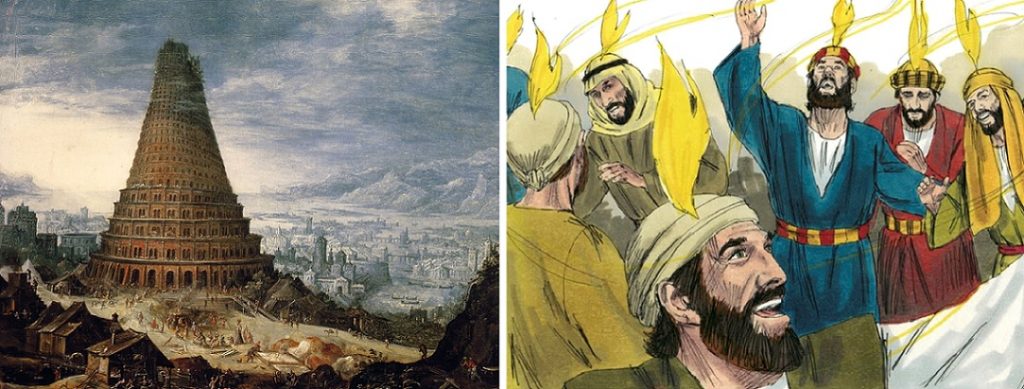Contents:
1) The Architect’s Blueprint (Jefferson David Tant)
2 News & Notes
——————–

-1-
The Architect’s Blueprint
Jefferson David Tant
Let’s say that you want to build a house, so you hire an architect to draw up plans according to your wishes. A builder is then contracted to construct the home as per the architect’s blueprints.
But something happens along the way, as the builder decides he has his own preferences, and so follows the blueprints only when he wants to, and inserts his own ideas when it suits him. Obviously, this will not sit well with you, as he is not following your directions. If you returned from a long journey and found a house completely different than what the blueprints stipulated, you would certainly reject it.
Now, let’s make an application to the church, which is God’s house. No, not the building, but the people, for God “does not dwell in temples made with hands” (Acts 17:24). The apostle Paul declared that “we are God’s fellow workers; you are God’s field, God’s building” (I Corinthians 3:9).
Then the question is, does God have a plan, a blueprint or pattern for his church? The writer of Hebrews makes a comparison between the Old and New Covenants in Hebrews 8:5: “Now if He were on earth, He would not be a priest at all, since there are those who offer the gifts according to the Law; who serve a copy and shadow of the heavenly things, just as Moses was warned by God when he was about to erect the tabernacle; for, ‘See,’ He says, ‘That you make all things according to the pattern which was shown you on the mountain.’” In Exodus 25 and following, God gave very detailed instructions as to the construction of the tabernacle, and he expected Moses to adhere to it.
The point the writer of Hebrews is making is that the New Covenant or Testament is superior to the Old, and thus Christ is High Priest over a superior covenant. Now, if the church (God’s present place of dwelling) is superior to the tabernacle in the Old Testament (representing God’s presence with Israel), then why should we regard as any less important the plans for the church than the plans for the tabernacle?
Go back to Paul’s statement in I Corinthians 3:9-11: “For we are God’s fellow workers; you are God’s field, God’s building. According to the grace of God which was given to me, like a wise master builder I laid a foundation, and another is building on it. But each man must be careful how he builds on it. For no man can lay a foundation other than the one which is laid, which is Jesus Christ.” We certainly recognize that a structure must follow the lines of the foundation. If the builder does not follow the lines of the foundation, obviously the structure will fall. One of the heroes in the Hall of Fame of Faith is Abraham. “By faith he lived as an alien in the land of promise, as in a foreign land, dwelling in tents with Isaac and Jacob, fellow heirs of the same promise, for he was looking for the city which has foundations, whose architect and builder is God” (Hebrews 11:9-10).
Obviously the writer of Hebrews understood the correlation between the architect, builder, and the foundations upon which the structure stands. In a spiritual sense, he referred to heaven in these terms. And Paul used the same language with respect to the church. Did not Jesus make a promise: “I will build my church”? (Matthew 16:18).
Where do we go to find the architect’s blueprint for the church? Obviously, we must consult the New Testament, wherein we find instructions God has given us for his church. The plan is clear, and those who wish to follow the plans should have no trouble in understanding them. When we compare the plans God has given with what men have built, we find a great difference.
The Leaders in the Church
The Bible
Among the leaders are men who are called elders-presbyters/bishops-overseers/pastors-shepherds. These terms are all applied to the same men, and refer to different aspects of their function. (See Acts 20:17, 28, where all three terms are applied to the same men.)
We note that Paul appointed “elders” (plural) in the churches (Acts 14:23), and we never find a case of a single elder/pastor over a church. Furthermore, the term “pastor” in the Bible does not refer to the one who is the “preacher.” That is a different function.
The qualifications for these men are given in I Timothy 3:1-7 and Titus 1:5-9. Note that these are to be married men who have believing children, and who lead godly lives. In addition, they must have a good knowledge of God’s Word.
The churches of men
Not many churches of men pay any attention to the Biblical qualifications. More and more churches are ordaining women as pastors, and there seems to be no stipulation that pastors must be married, or be old enough to have believing children. Furthermore, the common practice is for a church to have one pastor, rather than the plurality that we find in God’s blueprint. Besides, in God’s plan, the pastor and the preacher are two separate functions. God certainly had a reason for not including a “one-man-rule” plan in his blueprint.
Conclusion
Will God accept a church that has not followed his plan in this area? Certainly not. Why do we think man’s wisdom is greater than God’s wisdom? Remember, Paul admonished us to “be careful how we build.”
The Worship of the Church
The Bible
The examples we find in the New Testament are very clear and easy to understand. The Christians came together to:
1) Be instructed in the Word of God (Acts 5:42; 20:7, etc).
2) Partake of the Lord’s Supper each first day of the week (Acts 20:7; I Corinthians 11:23-29). (Early church writers and historians agree that the church met every Sunday to observe this memorial.)
3) To sing hymns of praise and encouragement. Their singing was vocal, without instruments of music, and congregational, as all sang together (Ephesians 5:16; Colossians 3:16). (Once again historical writers are in total agreement that it was hundreds of years before any instrumental accompaniment was introduced.)
4) To make a contribution from their resources to carry on the responsibilities of the church on the first day of the week (I Corinthians 16:2).
5) To make petitions to God for their needs and to express thanksgiving (I Timothy 2:1-2; Acts 12:12, etc.).
The churches of men
In four of the five aforementioned items, we find churches not respecting the pattern God has given.
1) In addition to teaching God’s word (and in some churches very little of that is taught), we find churches offering classes in how to care for your horse, furniture repair work-shops, sewing classes, auto care clinics and you name it, and you will probably find some church practicing it.
2) With respect to the Lord’s Supper, there are many variations. As opposed to the early church’s practice of partaking every first day, we find denominations taking it every day, once a month, once a quarter, once a year, and some do not take it at all. And not only do some deviate from the Bible pattern of unleavened bread and fruit of the vine, I know of some who have used potato chips and Coke, and who knows what else.
3) Orchestras, bands and all sorts of musical instruments and dancing are added. Many have told me that this is great entertainment. I have been to denominations where the music is so loud that it is deafening (it gave me a headache), and it has been accompanied with suggestive dancing. In churches I have visited, audience participation is limited because the choir does much of the singing, or the music is so loud that it drowns out what the audience attempts to do.
4) Churches of men have been very inventive when it comes to raising money. Door to door soliciting, bake sales, rummage sales, selling merchandise, taking collections week-nights or every time the church meets, charging for various classes, selling investment portfolios, etc.
5) The only departure that might be observed in prayers would be in the fact that in some churches women may lead in prayer in the assembly or class when men are present, even though the Bible forbids women from taking a leading part in such gatherings. “Let a woman learn in quietness with all subjection. But I permit not a woman to teach, nor to have dominion over a man, but to be in quietness” (I Timothy 2:11-12; cf. I Corinthians 14:34). This also precludes a woman from being a pastor or preacher.
Conclusion
Why do men think their way of worshiping God is better than the way God has given? Are men to worship to please themselves, or should they accept what God wants? I had a woman tell me she could never give up what her church was doing, because she liked it so much. Peter writes that we, “as living stones, are being built up as a spiritual house for a holy priesthood, to offer up spiritual sacrifices acceptable to God through Jesus Christ” (I Peter 2:5).
How “acceptable” would it be for me to buy a chainsaw for my wife’s birthday because it pleased me? I guess that would be as acceptable as her buying me some earrings because they were really pretty, and they pleased her.
The Organization of the Church
The Bible
In reading through the New Testament, we find the pattern of local, independent churches that are autonomous, with no hierarchy or organizational structure other than the local church. They were bound together only inasmuch as the individual Christians are family members — brothers and sisters in the family of God, which is the church or body of Christ. Each local congregation was led by those who were called elders/shepherds/pastors.
Peter instructed the elders to “Tend the flock of God which is among you, exercising the oversight, not of constraint, but willingly, according to the will of God; nor yet for filthy lucre, but of a ready mind” [my emphasis] (I Peter 5:2).
The churches of men
Most every denomination has some organizational structure or government, whether it be synods, a pope, conventions, area bishops, a president, or any number of different arrangements. But history has shown that often the leadership is far more liberal than the members in the pews, and this presents problems. Evidently in God’s wisdom, he wanted each local congregation to be independent and self-sustaining.
To illustrate the point, suppose I have a single-pane large window in my den, and my children are playing ball in the yard. Then an errant ball comes crashing through my window, and the whole thing is destroyed. But suppose that same opening was composed of 12 smaller individual panes. That errant ball then destroys only one pane, not the whole structure.
Making an application to the denominational governmental structures, if there is some error in the leadership, it affects the whole denomination, and I have seen this happen time and again. But if every local church is independent and self-governing, then whenever some local church goes off track, it does not affect other churches. Surely God’s wisdom can be seen in the pattern he set for us.
The Names that Are Worn
The Bible
There are various names by which God’s people are identified in the Bible. Notice a few of them. The church, God’s people, is called the “kingdom of God,” in Romans 14:17 and other places. Christ is king, and we are citizens of the kingdom. Another name given is “church of God” (I Corinthians 1:2). “Church” is from “ekklesia,” and basically means “called out,” thus those who are “called out of the world that belong to God.” The church is also referred to as the “bride” (Revelation 21:9). In this, the church is married to Christ, and thus takes his name, as it is also called the “church of Christ” (Romans 16:16). Another term is the “household of God” (Ephesians 2:19). In this family picture, we know God is our father, Christ is our older brother, and we are God’s children. God saw fit to use these, and other terms, to describe his church, his people. They all refer to the same spiritual body, but emphasize different characteristics of it.
The churches of men
Men have been very inventive in coming up with their own names. Examples: The Church of Daniel’s Band, The Church of Gloom, Two Seed in the Spirit Baptist Church, The Nudist Christian Church of the Blessed Virgin Jesus, Holy Ghost Repair Service.
While the foregoing names might bring a chuckle, in one sense they are no different than traditional denominational names — Baptist, Methodist, Presbyterian, Roman Catholic, Pentecostal, and on into infinity, considering there are some 32,000 different denominations in the United States. These names are all the inventions of the imaginations of men. Why are the designations given by the Divine Architect not suitable?
Suppose I wanted to erect a memorial to one of my grandfathers, Lorenzo Antonio Gotto. I draw up the plans and give them to a builder. He then completes the monument, and takes me out to see the completed monument. The inscription says, “In memory of Margaret Thatcher.” Would I accept it? Will God accept the names men have invented to give to that which is built as a memorial to his Son? Why can we not be satisfied with God’s blueprint?
God’s Plan of Salvation
The Bible
God’s Word gives very clear directions as to how one obtains forgiveness of sins and becomes a part of God’s family—the church.
1) Obviously, hearing the gospel is the beginning, as is seen in Romans 10:14, for this is the beginning of…
2) Faith, without which, one cannot come to God (Hebrews 11:6). This faith is not only a belief in God, but a belief in God’s grace, knowing that we do not deserve, nor can we earn salvation merely through good works. “Therefore, having been justified by faith, we have peace with God through our Lord Jesus Christ, through whom also we have obtained our introduction by faith into this grace in which we stand; and we exult in hope of the glory of God” (Romans 5:1-2).
3) Repentance, for we cannot continue to live in and for the world if we want to live in a relationship with Christ (Luke 13:3).
4) The confession of our faith is a part of this process, as we are to “confess with our mouth Jesus as Lord” (Romans 10:9).
5) Baptism for the remission of sins. This baptism is an immersion in water, as all authorities in the New Testament language of Greek agree that the word “baptidzo” means to “dip, plunge, immerse.” Its purpose is at least three-fold.
a) It is associated with the removal of sins, for God promises his grace to take away our sins when we comply with his teaching. “He who has believed and has been baptized shall be saved; but he who has disbelieved shall be condemned” (Mark 16:16). Then we find Ananias giving instruction to Saul of Tarsus in Acts 22:16: “Now why do you delay? Get up and be baptized, and wash away your sins, calling on His name.”
b) Baptism is associated with our entrance into Christ, into his body. “For all of you who were baptized into Christ have clothed yourselves with Christ” (Galatians 3:27).
c) Baptism makes us partakers of the death, burial and resurrection of Christ. “Or do you not know that all of us who have been baptized into Christ Jesus have been baptized into His death? Therefore we have been buried with Him through baptism into death, so that as Christ was raised from the dead through the glory of the Father, so we too might walk in newness of life. For if we have become united with Him in the likeness of His death, certainly we shall also be in the likeness of His resurrection, knowing this, that our old self was crucified with Him, in order that our body of sin might be done away with, so that we would no longer be slaves to sin” (Romans 6:3-6). The picture Paul gives is that of putting to death our sinful life by burying it, and then we are raised from that watery grave to a new life.
Note that in the passages cited baptism precedes, goes before salvation and the washing away of sins. Furthermore, since Galatians 3:27 states that we are baptized into Christ, how is it that some teach we are saved before baptism? Are we then saved outside of a relationship with Christ? Who can believe it? Some claim that we are saved before baptism, but the Scriptures show otherwise.
6) A sixth element in our salvation is a life of faithful service. It’s not like buying a ticket to get on the train. Once you’re on, you don’t have to do anything else but sit down and enjoy the ride. Our Lord urged us to “Be faithful until death, and I will give you the crown of life” (Revelation 2:10).
The churches of men
Basically, many denominations have just one step in their plan of salvation. A direct quote from two prominent denominational creed books says, “Wherefore, that we are justified by faith only is a most wholesome doctrine, and very full of comfort.” Many other denominations say the same thing, only phrased differently.
What is wrong with such a statement? For one thing, it excludes repentance. “Oh, but the Bible says we must repent of our sins,” is the reply. Then it is not faith only! “Only” is an exclusive and excluding word. If I am buying a plane ticket to Timbuktu, and I tell the agent that I am the only one flying, I am not expected to show up with my wife and children. Anyone can understand that.
To be honest, it must be admitted that the words “faith” and “only” do appear together in the Bible. That is in James 2:24: “You see that a man is justified by works and not by faith only.” It is not that our works save us, but James clearly states that it is an obedient faith that accompanies salvation. Peter confirms this in I Peter 3:21: “Corresponding to that, baptism now saves you–not the removal of dirt from the flesh, but an appeal to God for a good conscience–through the resurrection of Jesus Christ.” In the preceding verse, Peter mentions Noah’s salvation by water, and compared that to the matter of baptism.
With respect to baptism, there are other ideas of men that confuse and contradict. Some denominations sprinkle water on the subject, while others pour water. One church has been said to sprinkle rose petals. Then other denominations have eliminated baptism altogether. Some have baptisms once a year, while others may schedule a baptism every few months, whereas in the Bible baptism takes place as soon as a person is told what to do.
Some baptize babies, and some even will baptize those who are dead, while some baptize living persons for dead people. The question is, who gave these churches the right to change the blueprints? If Christ is our Savior, then doesn’t he have the right to set the terms?
What Happens When We Change the Blueprints?
Our Lord had to deal with many in his day who “changed the blueprints.” Time and time again he rebuked the religious leaders among the Jews. Note carefully what he said in Matthew 7:21-23. “Not everyone who says to Me, ‘Lord, Lord,’ will enter the kingdom of heaven, but he who does the will of My Father who is in heaven will enter. Many will say to Me on that day, ‘Lord, Lord, did we not prophesy in Your name, and in Your name cast out demons, and in Your name perform many miracles?’ And then I will declare to them, ‘I never knew you; depart from me, you who practice lawlessness.’”
What was the problem? These were people who called Jesus “Lord,” and who were religious people doing many good things. A key word in the passage is the last one cited — “lawlessness.” Strong’s Greek Dictionary defines this as “illegality, i.e. violation of law…” The word in Greek is “anomia.”“Nomia” is “law,” and the alpha preceding it negates the meaning. We do the same with “un.” We speak of something that is “lawful,” but when we put the “un” in front of it, we make the meaning negative.
And so it was with those to whom Christ referred. While they may have been doing things that were good in their own way of thinking, they were actually practicing things that were “unlawful, without law.” Simply put, they were doing things that were “without authority.” (Well, actually there was some authority—their authority!)
Much could be said about the matter of authority, but we will be brief. Paul instructed the church at Colossae in these words: “Whatever you do in word or deed, do all in the name of the Lord” (Colossians 3:17). “In the name of the Lord” signifies the need for authority. Thus in “word,” our teaching, or “deed,” our practice, we need to find a “thus sayeth the Lord.” If we cannot do so, then we are acting on our own authority, and we find ourselves in the same situation as those in Matthew 7:21-23.
Consider also our Lord’s words concerning the religious leaders of his day: “But in vain do they worship me, Teaching as their doctrines the precepts of men” (Matthew 15:9). When I read the creed books, the church manuals, the catechisms, etc., of the various denominations, I am not reading the Word of God, I am reading the doctrines of men! This presents a real problem, since truth does not contradict itself. These books not only contradict the Bible many times, but they also contradict one another. And what is the ultimate result? “But he answered and said, Every plant which my heavenly Father planted not, shall be rooted up” (Matthew 15:13). God says that those religious groups that follow the precepts of men shall be rooted up. God will not accept them. I didn’t say it. God did!
I remember having a discussion with a friend on baptism, as to whether it should be by immersion or by sprinkling (as his church practiced). He did not deny the evidence I presented which clearly showed immersion was the Biblical practice. But he dismissed the whole matter by declaring, “I don’t think it makes any difference.” Well, it may have made no difference to him, but the question is, “Does it make any difference to God?” We have the story of Nadab and Abihu in Leviticus 10:1-3, as they came to offer sacrifices to God. “Now Nadab and Abihu, the sons of Aaron, took their respective firepans, and after putting fire in them, placed incense on it and offered strange fire before the LORD, which He had not commanded them. And fire came out from the presence of the LORD and consumed them, and they died before the LORD. Then Moses said to Aaron, ‘It is what the LORD spoke, saying, “By those who come near Me I will be treated as holy, And before all the people I will be honored.”‘ So Aaron, therefore, kept silent.”
Consider the fact that they believed in God, and were worshiping God. But in doing so they were roasted alive. Why? Because they did not follow the blueprint,the pattern that God had given. They offered “strange fire,” which the LORD “had not commanded them.” They had no authority for what they had done. I am quite sure they must have thought, as my friend thought, “I don’t think it makes any difference.” When Nadab and Abihu did what they wanted rather than what God wanted, the text says they neither honored God nor treated him as holy. Is is any different today?
Question: Must one believe the Catholic Catechism, the “blueprint” for the Catholic Church, in order to go to heaven? Must one believe the Methodist Discipline to go to heaven? Must one believe the Baptist Manual to go to heaven? Must one believe the Book of Mormon to go to heaven? Must one believe the Bible, God’s “blueprint,” in order to go to heaven? You know the answer! God gave the perfect blueprint, so why do we need other books of laws and regulations? If God’s book was good enough for Christians in the first century, why isn’t it good enough for us today?
In closing, consider a clear example of changing the blueprint. Following is a quote from Hiscox Standard Manual for Baptist Churches, page 22: “Church Membership” – “It is most likely that in the Apostolic age when there was but ‘one Lord, one faith, and one baptism,’ and no differing denominations existed, the baptism of a convert by that very act constituted him a member of the church…In that sense, ‘baptism was the door into the church.’ Now, it is different; and while the churches are desirous of receiving members, they are wary and cautious that they do not receive unworthy persons. The churches therefore have candidates come before them, make their statement, give their ‘experience,’ and then their reception is decided by a vote of the members. And while they cannot become members without baptism, yet it is the vote of the body which admits them to its fellowship on receiving baptism.”
Did you notice the words, “Now, it is different”? If that’s not a clear case of changing the blueprint, then I don’t know what would be.
God will not recognize those who refuse to follow the blueprints, who have no regard for the pattern given in God’s Word, no matter how much good they think they are doing. What do you think would have happened to Moses if he had decided to alter God’s design for the tabernacle?
Search the Scriptures! Follow the blueprints! We must know for ourselves what the architect’s plans are, and not just depend on what others tell us. The apostle Paul commended the people of Berea for doing just that. “Now these were more noble-minded than those in Thessalonica, for they received the word with great eagerness, examining the Scriptures daily to see whether these things were so” (Acts 17:11). Our salvation is too important for us to just depend on what some preacher/pastor/priest tells us. We must know for ourselves.
You remember the passage in Hebrews 11 about Abraham “looking for the city which has foundations, whose architect and builder is God” (Hebrews 11:9-10). Suppose that when Abraham arrived in that heavenly city he began to look around and decided that he didn’t like the way things were laid out. So he set out to change the architecture. How well do you think that would have gone over? Obviously, we know that would not happen. But it happens over and over when men tamper with God’s pattern for the church.
Some years ago, our family took in a troubled teen who had to be away from her family. My wife showed Emily her room, and then my wife went to do other things. In a few minutes there came the sound of thuds, bangs and scrapes from Emily’s room. When my wife went to see what was going on, Emily was moving every stick of furniture in the room. “Well, gag, I didn’t like it the way it was.” We wonder if that’s the attitude men have when they change everything in the Lord’s church to suit themselves. My wife didn’t appreciate Emily’s lack of respect for what we had provided. And we can be sure that God does not appreciate the lack of respect men show for what he has provided.
My question to those who practice or believe things I cannot find in the Word of God is simply this, “Where is the scripture? Please give me book, chapter and verse.” Without that, I cannot accept it. And neither should you.
— Via the La Vista church of Christ, Omaha, Nebraska
——————–
-2-
News & Notes
Folks to be praying for:
Jamie Cates is recovering from a double-lung transplant, which will require his remaining near the hospital for the next six months.
Joyce Rittenhouse’s brother will be having his heart surgery July 7, which will involve two surgeons, and will also have a second surgery on July 8 with two surgeons. A 6″ Gore-Tex graft will be inserted into his heart’s main artery, and other procedures will also be performed.
James Medlock came home from the hospital Friday. They eliminated the fluid in his left lung, which was caused by the pneumonia. But they said that he would be having other fluid problems, due to his heart value not functioning properly. That was actually the reason why he went into the hospital on April 7 (spent 6 days there) and then was transferred to the nursing home for 21 days. It was fluid build-up because of that bad heart valve. For that reason, James has to be weighed every morning; and if his weight has gone up 5 pounds or more from the previous time, he then needs to be taken to the hospital. Since James has difficulty in standing on a regular scale, the Medlocks have contacted the hospital about getting the type of scale that will work with the hospital bed they have for James in their home. It will show the person’s weight while he is still in bed. The result of the testing they did on James for covid-19, while in the hospital, showed to be negative.
Things went smoothly for Deborah Medlock Friday with her 3-needle biopsy. To keep her from feeling any pain, they put her to sleep for what was probably about a 20-to-30-minute procedure. She should hear the results this Tuesday at her follow-up.
Following the two epidurals that Doyle Rittenhouse recently received, he will also be given two more on July 2. Then, about a week afterwards, if these have still not solved his problem, he will receive two more. So far, his condition has only become worse. The epidurals have not been eliminating his back pain. If that continues to be the case through all three sessions, the next step will then be the spacer-surgery for his spine.
Ginger Ann Montero’s MRI last week showed a possible pinched nerve that she will be seeing a pain doctor for this week.
Joyce Rittenhouse is glad to have eliminated a painful kidney stone, about 2:30 a.m. Thursday, that had been lodged in her bladder. She is now back on antibiotics.
Lanell Montero Dapello is now healing from a broken ankle.
I’m glad to say that we now have a new sister in the Lord! Tina Allen was baptized Wednesday evening into Christ (Gal. 3:27), where there is no condemnation (Rom. 8:1), to have all of her sins blotted out by the precious blood of Jesus (1 Pet. 1:18-19; Eph. 1:7). She had repented of all her transgressions (Luke 13:5), acknowledged her faith in Christ (Rom. 10:9-10; Acts 8:36-38), was immersed in water as a sinner and came up as a saint through faith in the working of God (Col. 2:12; 1 Cor. 14:33) and now has that new life in Christ Jesus (Rom. 6:3-4; 2 Cor. 5:17) with all her sins washed away (Acts 22:16) and brought into that saved relationship with our loving and merciful heavenly Father (Mark 16:16; 1 Pet. 3:21; 1 John 3:1-3) that is enjoyed in the kingdom of God’s dear Son (Col. 1:13), which is also referred to as the church (Col. 1:18) and the body of Christ (Eph. 4:12). And all the angels in heaven are also rejoicing! (Luke 15:10). Let us pray for Tina’s spiritual development, that she will continue to “grow in the grace and knowledge of our Lord and Savior Jesus Christ. To Him be the glory, both now and to the day of eternity. Amen” (2 Peter 3:18, NASB).
Let us also continue to remember the following in prayer: Elaine Abbott, Ray Daugherty, Rick Cuthbertson, Jim Lively, A.J. & Pat Joyner, Shirley Davis, Rex & Frankie Hadley, and Kerry Williams.
——————–
The Steps That Lead to Eternal Salvation
1) Hear the gospel, for that is how faith comes (Rom. 10:17; John 20:30-31).
2) Believe in the deity of Jesus Christ (John 8:24; John 3:18).
3) Repent of sins (Luke 13:5; Acts 17:30).
4) Confess faith in Christ (Rom. 10:9-10; Acts 8:36-38).
5) Be baptized in water for the remission of sins (Mark 16:16; Acts 2:38; 22:16; Rom. 6:3-4; Gal. 3:26-27; Col. 2:12; 1 Pet. 3:21).
6) Continue in the faith, living for the Lord; for, if not, salvation can be lost (Matt. 24:13; Heb. 10:36-39; Rev. 2:10; 2 Pet. 2:20-22).
——————–
Tebeau Street
CHURCH OF CHRIST
1402 Tebeau Street, Waycross, GA 31501
We are currently meeting for only our Sunday 10 a.m. worship service each week, due to the coronavirus situation.
evangelist/editor: Tom Edwards (912) 281-9917
Tom@ThomasTEdwards.com
http://thomastedwards.com/go (older version of the Gospel Observer website, but with bulletins going back to March 4, 1990)





